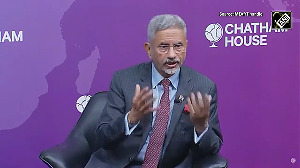"I don't believe this is it. I bet you the Grand Prix will be back in no time to Austria," said Max Kainz, a deer farmer.
"They're (Austrian government) apparently talking about lifting the ban on tobacco advertising just for that weekend to bring the race back -- and that was the only thing that made Ecclestone take it away," he added.
The race at the scenic A1-Ring has been presented as a farewell after Formula One supremo Bernie Ecclestone said the Grand Prix would be dropped from next year's calendar because of the country's backing of EU legislation against tobacco advertising.
New races in China and Bahrain are due to come on stream next year.
On Friday, however, Ecclestone raised hopes of a possible reprieve and an imminent return.
"Let's see what happens with our friend Red Bull, see how he makes what he does here and we'll see. Maybe we are going to come back," he said.
Dietrich Mateschitz, owner of the Red Bull energy drink business and sponsor of the Sauber Formula One team, plans to invest up to 300 million euros ($342.8 million) over the next three years to create a motorsport academy at the A1 Ring.
Ecclestone also said the Grand Prix calendar, normally 17 races but 16 this year as a result of the Belgian
Locals in Styria, the rural province in the south of Austria where the A1-Ring is located, still hope the country's top sporting event can be resurrected.
Rudi Fandl, who runs a mobile roast chicken stand and bar inside the camping site by the racetrack, said: "As far as I've heard, the Austrian Grand Prix's going to be back again next year or the following after Red Bull has rebuilt the track."
SPORTING EXTRAVAGANZA
Tens of millions of euros in public funds have been invested in the track since the mid-nineties, making the A1 Ring a costly, rather than profitable, sporting extravaganza.
Staging the Formula One has doubtless boosted the local economy through tax revenues and increased employment, but it is less certain whether this makes up for the large sums the race costs the province.
Red Bull boss Mateschitz, who is expected to take over the track in October, said each race held here amounted to a loss for the province of Styria.
"A Formula One race may be important for one's image, for the level of recognition, for one's reputation," Mateschitz told Austrian weekly current affairs magazine Profil.
"(But) even a well visited race in Spielberg has meant up until now a loss of two to four million euros. And it's several times that if it rains."








 © 2025
© 2025